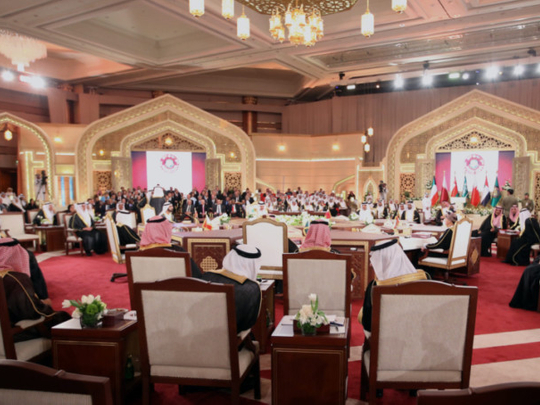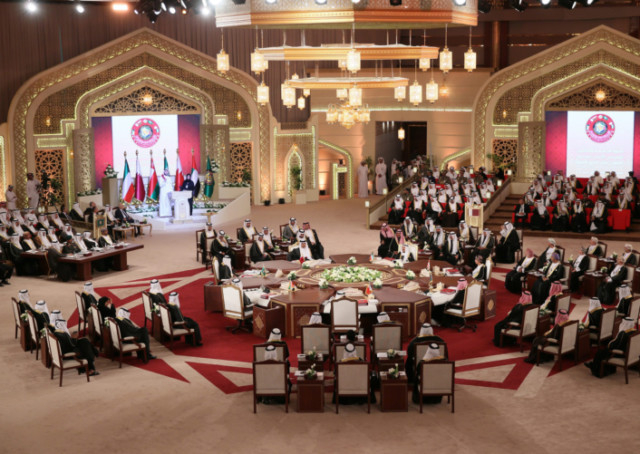
Nothing shows the confusion in regional security matters more than the on-off Iranian-American military relationship in fighting Daesh (Islamic State of Iraq and the Levant). The remarkable American acquiescence over Iran’s participation in the fight against Daesh in Iraq over the past few months can only be matched by a future fall-out when the war against Daesh moves to Syria and Iran backs the Al Assad government against the coalition. The scale of the threats flying around the Gulf and Levant means that there is broad agreement that this dangerous security situation needs to be handled by a yet-to-be-agreed “regional security architecture”. But there is no agreement on how such an alliance can be built.
This debate was a major theme running though the recent Manama Dialogue organised by the International Institute of Strategic Studies in Bahrain last week, where some argued that key players Saudi Arabia and Iran needed to start a bilateral process. But they acknowledged that that would require a totally new level of trust between the two regional powers. Others took an even more ambitious look at a wider process involving the Gulf Cooperation Council (GCC), Iran and Iraq, and anyone else within shouting distance, which may also include Egypt and Turkey.
Nonetheless, in the absence of any such regional defence network, everyone has to put up with the present situation of ad hoc responses to assorted challenges as they emerge, usually involving substantial leadership from the US and other powers from outside the region. These inevitably are reactive to events and therefore offer no leadership and are frequently muddled in their long-term political aims, even if they are precise about the immediate military actions.
The GCC has managed such regional military cooperation for decades, although only as a defensive alliance within its borders. The GCC met later last week for its annual summit and it had a plan for a unified military command on the agenda, which was going to strengthen its operational capabilities while not replacing the long established Peninsula Shield.
In the event, the GCC agreed to form a regional naval command, which will be based out of Bahrain, and reinvigorate its regional police network, GCC-POL, based in Abu Dhabi, which is a law-enforcement agency for sharing intelligence designed to combat organised crime, but will now be put to work to combat terrorism as well. The GCC summit also took on board the more wide-ranging task of engaging Daesh terrorists on a theological and emotional level, and taking back control of Islam’s agenda from the terrorists.
The GCC communique made a point of stressing the organisation’s commitment to “combating the ideology upon which terrorist groups are founded, especially as Islam is innocent of such ideology”. The GCC leaders went on to affirm that their policies are based on tolerance and coexistence among nations and people, “stressing that GCC countries stand firm against terrorist threats facing the region and the world in order to ensure security, stability and peace”.
This is the third arm of the fight against the radicals and it has to run parallel with military action, and finding stable political structures that will last. While the military challenge in Iraq is moving ahead quickly, finding a political structure that will rebuild a united Iraq is proving an almost insuperable challenge. Nonetheless, it is important that while handling these immediate problems, it is also essential to plan for the very long term as well.
Hoshyar Zebari, the highly experienced Iraqi politician who is currently the Finance Minister, said at the Manama Dialogue that the key long-term requirement for the safety of the region was stable institutions that safeguard the rights of citizens. “People need to feel that they are part of the state,” he said.
The UAE has articulated this challenge for some time. His Highness Shaikh Mohammad Bin Rashid Al Maktoum, Vice-President and Prime Minister of the UAE and Ruler of Dubai, made a key statement in September when he spoke of the importance of nurturing open minds, encouraging critical thinking, and stable institutions, in order to fight the terrorists’ ideologies.
Bahrain’s Foreign Minister Shaikh Khalid Bin Ahmad Al Khalifa emphasised the importance of speaking out and not being backward on this soft target, when he spoke of a need to tackle the terrorists’ ideology in a sustainable way that will offer a winning challenge that will last for generations. “Our problem is that we have not been as enthusiastic about speaking the truth as our enemies have been about their ideas,” he said.
“We need to organise so that we can ensure that future generations will not be terrorists,” said Shaikh Khalid. “Part of this is building democracy and sustainable institutions, and safeguarding the rights of citizens. People need to feel they belong to the state.”
In this context, Shaikh Khalid spoke of the importance of open education, echoing what many others have said when looking at how to tackle terror. “We need education that is based on true Islamic values of critical thinking. We need scholars and thinkers to speak up and give voice to our heritage.”










